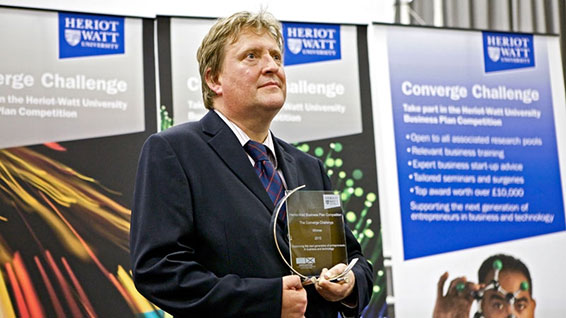
A lecturer at Heriot-Watt University has been awarded a prize worth £16,500 after winning a major competition aimed at entrepreneurial excellence.
Dr Paul Henderson from School of Engineering and Physical Sciences, Department of Chemistry, won the Converge Challenge competition after seeing off 27 other staff and student applicants from universities across Scotland in a series of knockout rounds, which included a 30-minute investor pitch to an expert panel made up of established Scottish entrepreneurs, investors and IP specialists.
The wide breadth of ideas for the business plans reinforces the entrepreneurial spirit that exists in our academics and students that will for sure help to grow the Scottish economy.
Paul's winning idea which so impressed the judges was to develop a saliva-based test for drug testing at the roadside and in the workplace.
The prize will allow Paul to spin out his company DrugCo to produce its first product, a device for the presumptive testing of narcotics in saliva for use at the roadside. This will be followed by devices for workplace drug testing and, in the longer term, for point of care diagnostic testing.
The prize package includes a £5,000 start up fund to help turn their plans into reality, free office accommodation as well as mentorship and support in legal matters, finance and business development from well established businesses in the Edinburgh area.
Paul Henderson and two runners-up were announced by David Lane, founder of Heriot-Watt's spin-out success SeeByte Ltd, the internationally renowned leader in autonomous systems and on of Heriot-Watt's most successful global spinout. and the University's Principal and Vice-Chancellor, Professor Steve Chapman at a special dinner, which took place on campus last night (28 September 2010).
Runners-up
The second place runners-up were: Dr Joanne Porter and Dr Mike Winson, of the School of Life Sciences at Heriot-Watt University for their business idea, Bryo-Actives. Bio-actives that will focus on an as yet unmet need for developing new anti-infective agents (total market size $33 billion) targeted at the increasing number of multi-resistant pathogenic bacterial strains that currently threaten public health.
In third place was Dr Nikolaus Klaus Metzger, Research Fellow of the School of Physics and Astronomy, University of St Andrews. Klaus's SmartLAS technology will transform the uptake of ultrashort pulse lasers into the multi-billion dollar laser industry. An ultrashort pulse laser is a laser that emits ultrashort pulses of light, generally of the order of femtoseconds. Such lasers are becoming a crucial tool in applications such as photo-masking computer chips, processing nano material and producing biophotonics and the total market is currently estimated at $260 million.
About the Converge Challenge
The Converge Challenge was set up by Olga Kozlova, Enterprise Creation Manager at Heriot-Watt University. She said: "This is the first time the Converge Project has run a business plan competition and the response from staff and students has been incredible.
"The quality of the proposals, the enthusiasm for their ideas, level of insight and commitment to excellence made the organisation of this competition enjoyable and the judging very challenging. We have seen a wide breadth of ideas for business plans from fashion to healthcare biosensors. I think this all reinforces the entrepreneurial spirit that exists in our academics and students that will for sure help to grow the Scottish economy. I hope that all our finalists go on to have an extremely successful career in business."
The competition attracted fewer than 40 entries from around Scotland and in total, £29,000 was awarded to the three winners.
The applicants took part in a two day commercialisation training course in July and went through three stage selection process before a shortlist of six finalists were chosen. During the final the judges assessed investment pitches based on the quality of products, the viability of the business idea and the individual's enthusiasm and drive to succeed.